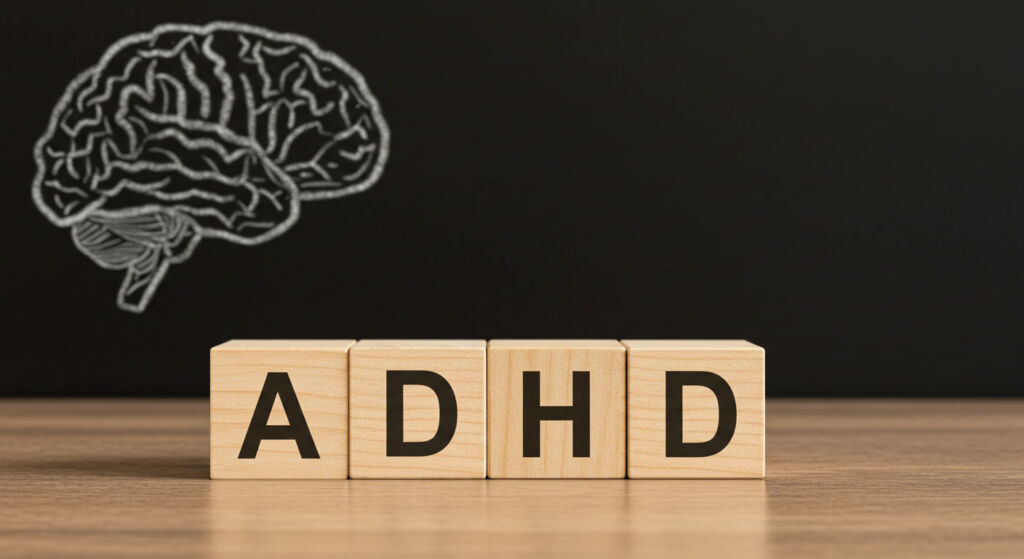
Attention deficit hyperactivity disorder (ADHD) is often misunderstood and, for many years, has been stereotyped as a condition mainly affecting men and boys who show signs of hyperactivity, like fidgeting, restlessness or the inability to engage in a quiet activity. A broader awareness of the full spectrum of behaviours associated with ADHD and a greater recognition by healthcare professionals of the common prevalence of the condition in women has recently led to an increase in adults discovering they have the condition.
There are two main symptom categories: inattentiveness, hyperactivity and impulsiveness. Many individuals remain undiagnosed well into adulthood; this is due to people’s ability to hide or mask their symptoms, the previous lack of awareness and understanding of the condition, or the misattribution of symptoms where differences may be considered personality quirks or habits rather than recognising them as indicators of a neurodevelopmental condition.
Recognising the subtle signs of ADHD is essential, particularly as the condition rarely exists in isolation.
Many adults with ADHD also experience co-existing conditions such as anxiety, autism spectrum disorder, dyslexia, or dyspraxia. In some cases, it overlaps with other mental health conditions, including mood disorders such as bipolar disorder or anxiety-related conditions like obsessive-compulsive disorder (OCD).
Without recognition and proper management, these challenges can affect everything from work performance to relationships with friends and family.
Everyday behaviours you might perceive as simple forgetfulness, restlessness, or difficulty focusing could, in fact, be signs of neurodivergence, and understanding those can be the first step toward gaining control, improving productivity, and enhancing well-being.

Chronic Forgetfulness
Regularly misplacing everyday items like phones, keys, or wallets may be more than simple absentmindedness. Individuals with ADHD struggle with a short attention span.
This has an impact on the brain’s working memory, affecting the ability to hold and manipulate information in the short term. This can lead to frequently forgotten appointments, deadlines, or tasks, causing daily life to feel overwhelming at times.
Procrastination and Task Paralysis
Most people will experience procrastination at some point in their lives; however, for those with ADHD, it can become extreme.
The frequent inability to commence simple, low-intensity daily activities like cooking a meal, booking an appointment, or doing the washing up due to feelings of overwhelm and resistance to or avoidance of the task makes simple things more challenging for those with ADHD.

Left unmanaged or undiagnosed, these feelings and procrastination around responsibilities can lead to feelings of shame and negative self-views for the individual, as well as the challenges of missed deadlines or incomplete tasks, whether at work or completing personal life admin.
Equally, individuals with ADHD may also experience periods of hyperfocus, spending a significant length of time concentrating on a single task and neglecting other responsibilities. The distinct contradiction between the two experiences is a common symptom of someone with ADHD.
Engagement During Conversations
Impulsivity, a common trait in ADHD, can often make social interactions challenging. With no malice intended, individuals will frequently interrupt and finish other people’s sentences, talk over people, or have difficulty staying engaged in conversations.
While some people may consider it rude, someone with ADHD will not always recognise the social cues indicating this type of behaviour and may instead try to get their point across without considering that they need to take their turn in the conversation.
On the reverse, for some people, their ADHD may be evidenced through a lack of impulsiveness and engagement by zoning out during discussions, indicating underlying neurodivergence.
Inability to Sit Still
A constant need for movement, such as tapping feet, the drumming of fingers, or shifting around in a chair, can be subtle signs of hyperactivity. However, this restlessness isn’t always intentional.
People with ADHD may have an internal feeling of agitation or an inability to relax, which can be particularly noticeable in environments requiring prolonged stillness, such as long meetings, flights, or social gatherings.
An individual with ADHD may, for example, struggle to sit through a lengthy presentation at work without fidgeting, feel physically uncomfortable for prolonged periods at the cinema or a concert, or find themselves pacing the room while on phone calls. While these behaviours might seem like simple habits, they can often be a way of self-regulating energy and maintaining focus.

Lack of Organisation Skills
The prevalence of hyperactivity, impulsiveness and inattentiveness is often the antithesis of structure and organisation. Those with ADHD frequently struggle to prioritise tasks, manage their time effectively, or maintain order. This often leads to poor planning, cluttered environments, or feeling overwhelmed by responsibilities, affecting both personal and professional lives.
The Importance of Recognising Differences
It’s important to be aware that ADHD doesn’t present itself uniformly across all individuals. Approximately three in 10 people with the condition experience challenges with concentration and focus without the accompanying hyperactivity or impulsiveness.
This is commonly known as attention deficit disorder (ADD), which often goes unnoticed due to its less obvious symptoms. Furthermore, there remains an imbalance in diagnosis as ADHD is more frequently diagnosed in men than women.
Women are more likely to exhibit symptoms of inattentiveness without the elements of disruptive behaviour, leading to underdiagnosis or misdiagnosis. This difference emphasises the need for heightened awareness and tailored approaches.
When to Seek Support
Vital in this context is to remember that ADHD is manageable with the right level of appropriate support. A formal diagnosis can provide clarity, coping strategies, and medical interventions, where appropriate, to navigate daily life more effectively. Recognising ADHD is not about labelling but understanding how your brain works.
If these everyday behaviours feel familiar, consider reaching out to a specialist for guidance. For more information, visit www.healthcareinmind.com.
About the Author

Dr Simon Le Clerc, MStJ, is the Medical Director at HealthCare In Mind, a dedicated service offering private autism, ADHD and mental health assessments, treatments and therapies to improve access to high-quality mental health diagnoses and address the growing wait times for critical mental health support.
HealthCare in Mind, part of RMI Group that has been delivering medical care since 2003, is run by the highly qualified specialist in child and adolescent psychiatry and intellectual disability psychiatry, Dr Kate Higham, and Medical Director, Dr Simon Le Clerc MStJ, alongside an expert team of psychiatrists, psychologists and therapists. Our team ensures you receive the highest quality mental healthcare tailored to your unique needs.
HealthCare In Mind’s mission is to provide the right support at the right time, empowering its patients to understand, manage, and overcome mental health challenges. Through appointments available via remote online services and in person, the HealthCare In Mind team specialises in offering diagnostic assessments for autism and ADHD without lengthy waiting lists.
![]()




You must be logged in to post a comment.